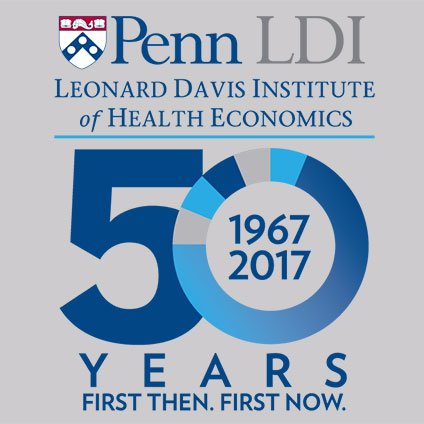Celebrating LDI’s 50th Anniversary

Origins of the Leonard Davis Institute of Health Economics
With a gift from Leonard and Sophie Davis, the University of Pennsylvania established the Leonard Davis Institute of Health Economics (LDI) in 1967, two years after Congress enacted Medicare. It was created to fill fundamental gaps in the evidence base that could inform policies critical to the financing and management of the nation’s increasingly costly and complex health care system. Today, LDI is considered one of the world’s leading university-based programs of its kind.
LDI and its senior fellows are among the pioneers in interdisciplinary health services research and have helped guide health policies at all levels of government and the private sector. More than 200 LDI senior fellows work to improve the health of the public through studies on the medical, economic and social issues that influence how health care is organized, financed, managed and delivered.
LDI is one of the first university programs to successfully cultivate collaborative scholarship among typically disparate disciplines. LDI is a cooperative venture among Penn’s health professions, business and communications schools (Medicine, Wharton, Nursing, Dental Medicine, Law School and Annenberg School for Communication) and the Children’s Hospital of Philadelphia, with linkages to other Penn schools, including Arts & Sciences, Education, Social Policy & Practice and Veterinary Medicine.
Mr. Davis, who died in 2001 at the age of 76, received an honorary Doctor of Laws degree from Penn in 1972 (Almanac January 30, 2001).
LDI Leadership
Robert D. Eilers, founding director of LDI, emphasized the Institute’s educational component. He created an MBA major in 1970, which was the first MBA program in health care management. He later added undergraduate and doctoral concentrations in order to train managers and analysts of health care systems. Dr. Eilers consulted with the Nixon Administration and helped draft the HMO bill that passed in 1973.
LDI’s other past executive directors included: Samuel P. Martin III, 1974-1978; William P. Pierskalla, 1978-1983; John C. Hershey, 1983-1984; Mark V. Pauly, 1984-1989; J. Sanford Schwartz, 1989-1998; and David A. Asch, 1998-2012. Daniel E. Polsky has led LDI since 2012.
Dr. John Eisenberg was founding chief of Penn’s Division of Internal Medicine, 1978-91 and was one of the first Robert Wood Johnson Clinical Scholars at Penn. In 1997 he became director of the federal Agency for Health Care Policy and Research and shepherded its transition to the Agency for Healthcare Research and Quality (AHRQ) as it is known today.
LDI Highlights
In 1976, LDI established the National Health Care Management Center, the first federally funded research center devoted to the management and organization of health care.
LDI hosted the Philadelphia Commission on AIDS in 1987 to help address Philadelphia’s growing AIDS crisis.
LDI launched the Summer Undergraduate Minority Research (SUMR) pipeline program in 1999 to address health disparities.
In 2008, the Institute founded the Center for Health Incentives and Behavioral Economics, one of just two NIH-funded centers dedicated to behavioral economic research in health.
LDI contributed to the UPHS Center for Innovation in Health Care Financing, which test how insights from behavioral economics and health economics can improve patient health and reduce the rate of growth in health care costs in 2011.
In 2012, LDI was involved in the establishment of the Penn Medicine Center for Health Care Innovation, which develops and tests new health care delivery strategies for better outcomes and value.
Today, LDI hosts 250 senior fellows and receives $100 million annually in research grants. LDI researchers publish more than 800 articles in peer-reviewed journals each year. LDI focuses on four key areas: improving health care delivery, optimizing insurance markets, motivating healthy behaviors and reaching vulnerable populations.
LDI forms collaborations to work toward measurable results, with organizations ranging from universities to companies to the federal government. It also provides seed funding to help launch early research careers.
LDI’s motto is: Research to Improve the Nation’s Health System: Theory Driven; Data Tested; Policy Focused
50th Anniversary Symposium
LDI is Penn’s hub of health system-related research, policy analysis and education. Penn LDI’s 50th Anniversary Symposium, Shaping the Future of Health Care will be held on campus on October 5-6. Two Penn LDI alumni: Katrina Armstrong and Patrick Conway, who have been ‘firsts’ in their fields, will receive the John M. Eisenberg Pioneer Award. LDI alumni social events will be held on October 4. Symposium registration includes the 50th Anniversary Dinner Celebration on October 5. The event will include a celebration in which former LDI executive director Mark Pauly will be honored for his career of scholarship and mentorship.
LDI is highlighting the pioneering people, events and publications that marked turning points in its history and in health policy on Twitter using the hashtag #PennLDI50.
For information, visit https://ldi.upenn.edu/50th-symposium
This post originally appeared on the University of Pennsylvania Almanac.